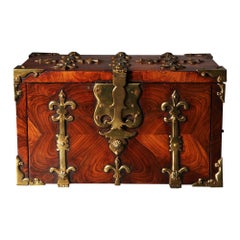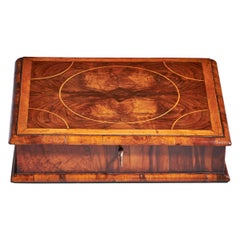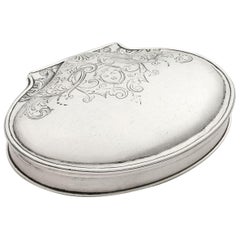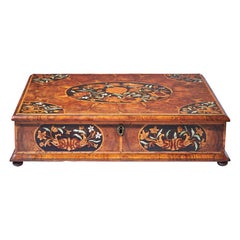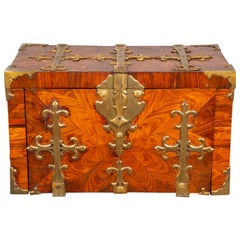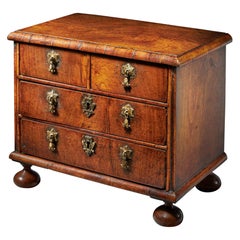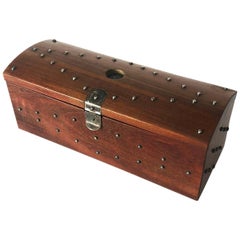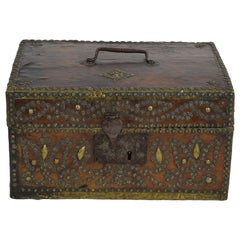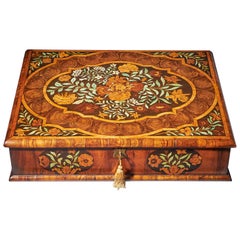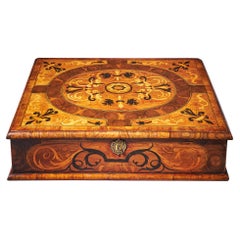William and Mary Boxes
12
to
10
1
12
12
12
1,030
726
672
670
255
210
166
156
121
109
101
97
86
65
65
53
38
28
12
Height
to
Width
to
11
8
5
5
4
12
11
9
Style: William and Mary
A Fine 17th C. William and Mary Kingwood Strongbox or Coffre Fort, Circa 1690
Located in Oxfordshire, United Kingdom
A William and Mary Kingwood/Princes oyster strongbox or Coffre Fort, circa 1680-1700, England. Adorned with highly decorative gilt brass strapwork and decorated in knife-cut oysters ...
Category
17th Century English Antique William and Mary Boxes
Materials
Kingwood, Oak
Fine William and Mary 17th Century Olive Oyster Lace Box
Located in Oxfordshire, United Kingdom
A fine late 17th-century olive oyster 'Lace Box' of small proportions, circa 1680-1690, England.
The cross-grain moulded and holly banded top is finely veneered in hand-cut veneers ...
Category
17th Century English Antique William and Mary Boxes
Materials
Olive
William & Mary Snuff Box Made in London, circa 1690
Located in London, GB
A Very Rare William & Mary Snuff Box Made in London circa 1690. Maker's Mark of Ah With a Crown Above and a Cinquefoil Below.
The Snuff Box is of escutcheon form with plain sides an...
Category
17th Century English Antique William and Mary Boxes
Materials
Silver, Sterling Silver
17th Century William and Mary Floral Marquetry Olive Oyster Lace Box, Circa 1685
Located in Oxfordshire, United Kingdom
A fine and rare 17th-century William and Mary olive oyster floral marquetry lace box, circa 1685. England
The cross grain olive moulded and holly banded top is centred by an oval of...
Category
17th Century English Antique William and Mary Boxes
Materials
Bone, Boxwood, Ebony, Oak, Olive, Tulipwood, Holly
William And Mary Kingwood Coffre-Fort
Located in Essex, MA
With rectangular hinged top with brass strap mounting. When open the front folds down to expose hidden compartments and wells. Case mounted the same as the lid. Side carry handles. I...
Category
Early 18th Century European Antique William and Mary Boxes
Materials
Brass
Rare 17th Century Miniature William and Mary Walnut Table Top Chest, circa 1690
Located in Oxfordshire, United Kingdom
A fine miniature William and Mary 17th century diminutive walnut chest.
From the reign of King William & Queen Mary (1688-1702), England.
The cross...
Category
17th Century English Antique William and Mary Boxes
Materials
Brass
William & Mary Oyster Veneered Walnut Glove Box on Stand - U.K. - Circa 1690
Located in Chatham, ON
Rare William and Mary walnut glove box on later stand - exceptional quality with aged patina - featuring elaborate walnut oyster veneered top and walnut veneered sides - the interior of the box lined with hand quilted floral silk Lampas fabric...
Category
Late 17th Century British Antique William and Mary Boxes
Materials
Fabric, Walnut
Miniature William and Mary 17th Century Diminutive Olive Oyster Chest, C.1690
Located in Oxfordshire, United Kingdom
A Fine Miniature William and Mary 17th Century Diminutive Olive Oyster chest.
From the reign of King William & Queen Mary (1688-1702), England.
The...
Category
17th Century English Antique William and Mary Boxes
Materials
Olive
17th C. Diminutive William and Mary Kingwood Strongbox or Coffre Fort, C. 1690
Located in Oxfordshire, United Kingdom
A William and Mary Kingwood / Princes Oyster Strongbox or Coffre Fort of Diminutive Proportions, Circa 1680-1700, England.
Adorned with highly decorative gilt brass strapwork and decorated entirely in knife cut oysters of kingwood, this box is fit for the most discerning of collectors. The large gilt brass shield-shaped clasp opens on a push-spring release to reveal a box interior lined in rosewood with one drawer and securing bolts.
Once the lid is opened you can reach inside to slide the original gilt brass bolt lock to open the fall. Once the fall is open you will find a drawer lined in oak and simulated kingwood.
The box appears decorative, but it was also very difficult to break open or steal. It has a strong lock to the centre and two bolts concealed in the sides, so that it could be screwed down into floorboards if necessary or that of a horse-drawn carriage. Strong boxes veneered in oysters of Princewood such as this were luxury objects.
The cabinet-makers who would have constructed and veneered the carcase apparently sold them, often using tropical hardwood veneers, and mounted it with sets of mounts, handles and locks bought in from brass founders. The elaborate veneering and conspicuous gilded brass mounts show that the appearance of these objects was important.
Thomas Pistor, of Ludgate Hill, London worked with the renowned cabinetmaker Gerrit Jensen...
Category
17th Century British Antique William and Mary Boxes
Materials
Kingwood
17th Century William and Mary Rosewood Coffre Fort on Stand, Secret Compartments
Located in Oxfordshire, United Kingdom
The unique 17th-century William and Mary rosewood coffre forte, circa 1690, raised on George I walnut stand, circa 1720.
The rosewood veneered exterior...
Category
17th Century English Antique William and Mary Boxes
Materials
Brass
Large William and Mary 17th Century Inlaid Olive Oyster Lace Box, Circa 1690
Located in Oxfordshire, United Kingdom
A fine and rare large parquetry inlaid 17th-century William and Mary period olive oyster lace box. 1680-1700, England
The cross-grain moulded top is ent...
Category
17th Century English Antique William and Mary Boxes
Materials
Oak, Olive, Ebony
17th Century William and Mary Olive Oyster Lace Box, Circa 1680-1700
Located in Oxfordshire, United Kingdom
A fine and rare 17th-century William and Mary period olive oyster lace box of perfect proportions. 1680-1700, England
The cross-grain moulded top is entirely covered in well-place...
Category
17th Century English Antique William and Mary Boxes
Materials
Olive, Holly
Related Items
Silver and Ebony William Spratling Dominoes Set
Located in Mexico City, CDMX
Amazing Wiliam Spratling Dominoes set made of ebony wood and silver inlay.
William Spratling (September 22, 1900–August 7, 1967) was an Americ...
Category
1960s Mexican Vintage William and Mary Boxes
Materials
Silver
Small 17th Century, French Coffer or Box in Leather
Located in Buisson, FR
Extremely old box that is covered with leather and decorated with iron and brass.
Rare find.
France, circa 1600-1700
Weathered and some losses.
Category
17th Century French Antique William and Mary Boxes
Materials
Iron
17th Century Nuremberg, German Iron Strongbox Jewels Casket
Located in Soquel, CA
Ornately painted cash box with iron hardware and key, on the original stand. Interior of box measures 8"W x 4"H x 3.75"D
Exceptional, small, late-renaissance, table-top, Nuremberg, iron, 'Wedding Box', strongbox or travelling safe with its original, naïve, painted decoration
This is a rare and small example of these characterful, early models of transportable safes. The much larger traditional chest...
Category
17th Century German Antique William and Mary Boxes
Materials
Wrought Iron, Iron
Fine 17th Century Dutch Colonial Armorial Tortoiseshell & Silver Box, Dated 1691
Located in Amsterdam, NL
A dutch tortoiseshell box with two engraved silver plaques
Amsterdam, 1691, with maker's mark of Steven des Rousseaux (1654-1733)
H. 5 cm
Diam. 12.5 cm
Note:
Steven des ...
Category
17th Century Dutch Antique William and Mary Boxes
Materials
Sterling Silver
Free Shipping
H 1.97 in Dm 4.93 in
Antique Floral Sterling Silver Vinaigrette Pill Snuff Box by William Simpson
By Simpson
Located in Miami Beach, FL
Highly stylized sterling silver vinaigrette, pill or snuff box by famed English silversmith William Simpson circa 1826 featuring a hand hammered raised floral design along the edges ...
Category
Early 19th Century English Antique William and Mary Boxes
Materials
Silver, Sterling Silver
H 0.43 in W 1.33 in D 0.91 in
Small 17th Century, French Coffer or Box in Leather
Located in Buisson, FR
Extremely old box that is covered with leather and metal decorations.
Rare find.
France, circa 1600-1700.
Weathered and some losses.
Category
17th Century French Antique William and Mary Boxes
Materials
Leather, Wood
McCobb / Umanoff Miniature Walnut Jewelry Chest
Located in Cincinnati, OH
A nicely grained medium toned walnut miniature chest or jewelry chest with two drawers having turned brushed stainless steel pulls. The chest is crafted to sit on top of a dresser or...
Category
Mid-20th Century American William and Mary Boxes
Materials
Walnut
18ct Gold Antique English Snuff Box - Hallmarked in London in 1803 - 54.9g
Located in London, London
Hallmarked in London in 1803 by George Longstaff, this very handsome, George III period, Antique 18ct Gold Snuff Box, features engine turned decor...
Category
Early 1800s English Antique William and Mary Boxes
Materials
Gold
H 0.79 in W 2.76 in D 1.58 in
Boiled Leather Trunk, Spanish, 17th Century
Located in Bruxelles, BE
Leather trunk
Spanish, 17th century
Boiled Leather, wood and iron
Measures: 22 x 53 x 32 cm.
Provenance :
- collection Metz-Noblat, Château de Clevant, France
Rectangular trunk of the form and size of a small suitcase with wrought iron hinges and lock-plate.
Wood, covered with leather, cut and embossed with every surface of the thick cow hide covered in interlace, zoomorphic features.
The construction method is boiled leather, often referred to by its French translation cuir-bouilli: a process used to change flexible, vegetable-tanned leather into rigid, moulded objects. For shaping of the vegetable-tanned leather, heat and moisture were used, as indicated by the term boiled leather. No written medieval sources describing the production of decorated cuir bouilli objects survive, so knowledge of the process relies on the important studies of the Scottish leather historian John William Waterer. A large range of methods, materials and techniques could be used in various combinations. The vegetable-tanned leather, made supple with moisture and heat, was stuffed, shaped and nailed to the rigid wooden coffer support. The stuffing material was probably modeled beeswax or stearin wax. To shape the leather, to create its topography, « Cushions » were made by lacing a thread through an awl hole and attaching the flexible leather and stuffing to the rigid wooden support on the bottom. Then the decoration was done: lines were incised through the upper layer of the leather (epidermis) with different thicknesses of knives or needles. Contours were created with deep v-shaped cuts, decoration with thin incision and final details with a needle point. For the incision and pouncing stage, the leather was probably kept heated and moistened for suppleness.
Once dry, the leather would be hard and rigid.
the saturated leather is worked over a form, possibly even damp sand, with the pattern shaped using bone or wooden tools. Compare to metal, leather was lighter and it offered protection from cuts and punctures. Cuir bouilli objects were produced by specialist leather workers and needed skillful craftsmanship.
The surface is filled with roundels shaped foliages enclosing animals, lions and peacocks. The foliate arabesques creating a vegetal connection tweet the animals create the impression of a lush verdant space . The vegetal pattern here employed in combination with geometrical pattern came from the pre-islamic artistic traditions of the Byzantine and Sasanian empires. An aspect of Islamic geometry Is the basic symmetrical repetition and mirroring of the shapes that create a sense of harmony.
The decoration of this truck is inspired by the islamic « arabesque » a form of vegetal ornament composed of spirals, intertwining plants and abstract curvilinear motifs. An arabesque character is given to the birds of the decorations through extreme stylisation. This arabesque maintained the classical tradition of median symmetry, freedom in Detail and heterogeneity of ornament.
The presence of the peacocks is a paradisiacal allusion: in popular Islamic literature they were among the original inhabitants of the garden of Paradise expelled with Adam and Eve. Peacock as a decorative motif may have originated in the West, despite their eastern provenance. There was an ancient belief that the flesh and feathers of peacock do not decay. This led to the peacock becoming a christian symbol for Christ’s resurrection.
Renowned for their decorative wall hangings, seventeenth-century Spanish leatherworkers also produced utilitarian objects, such as this trunk. A similar trunk is on display at the Metropolitan museum of art ( 09.158.1).
Related literature :
Davies L. 2006. Cuir bouilli. Conservation of leather and related materials, 94-102, Oxford: elsevier Butterworth-Heinemann
Grabar, Oleg. The Mediation of Ornament. Princeton: Princeton University Press, 1992
Gabriela Germana Roquez, "El mueble en el Peru en el siglo XVIII...
Category
17th Century Antique William and Mary Boxes
Materials
Iron
Onyx Box, Decorative, or Jewelry Box, Made in Italy circa 1970
Located in Auribeau sur Siagne, FR
Box in onyx, in a green color. It is a decorative or jewelry box, made in Italy circa 1970.
Category
1970s Italian Vintage William and Mary Boxes
Materials
Onyx
17th Century English Jacobean Carved Oak Bible Box.
Located in Vero Beach, FL
17th Century English Jacobean Carved Oak Bible Box.
Period Jacobean solid dark oak bible box from the 17th century. The front is beautifully carved wi...
Category
17th Century English Antique William and Mary Boxes
Materials
Wrought Iron
17th Century, French Oak Coffer or Box
Located in Buisson, FR
Extremely old and beautiful weathered oak box . Several old repairs that only add to the charm.
Rare find.
France, circa 1600-1700
Weathered, small losses and old repairs.
H:14,5cm ...
Category
17th Century French Antique William and Mary Boxes
Materials
Iron
Previously Available Items
Important 17th Century Charles II Marquetry Olive Oyster Lace Box, Circa 1680
Located in Oxfordshire, United Kingdom
A fine and rare 17th century William and Mary olive oyster marquetry lace box, circa 1670-1690. England
Attributed to Gerrit Jensen.
The mould...
Category
17th Century English Antique William and Mary Boxes
Materials
Bone, Boxwood, Ebony, Oak, Olive, Tulipwood, Holly
H 5.52 in W 23.04 in D 17.33 in
18th Century William and Mary Olive Oyster Arabesque Marquetry Lace Box, C.1690
Located in Oxfordshire, United Kingdom
An extremely rare late 17th-century arabesque marquetry and olive oyster lace box of large scale, from the reign of William and Mary, circa 1690. England
The cross-banded ovolo-mo...
Category
17th Century English Antique William and Mary Boxes
Materials
Olive
H 5.52 in W 22.64 in D 17.72 in
17th Century William and Mary Kingwood Coffre Fort Box Concealing Three Secrets
Located in Oxfordshire, United Kingdom
A superb William and Mary Kingwood / Princes Oyster strongbox or coffre fort of small proportions, circa 1680-1700, England.
Adorned with highly decorative thick gilt brass strap...
Category
17th Century British Antique William and Mary Boxes
Materials
Oak, Kingwood
Free Shipping
H 8.27 in W 14.38 in D 9.26 in
Rare William and Mary 17th Century Carved Oak Deeds Box of Small Proportions
Located in Oxfordshire, United Kingdom
A very charming 17th-century oak deeds box with deep carved decoration to the freize. The box is very well made for the period with visible through dovetails.
Originally the box ...
Category
17th Century English Antique William and Mary Boxes
Materials
Oak
H 9.06 in W 20.08 in D 11.03 in
17th Century William and Mary Floral Marquetry Olive Oyster Lace Box, circa 1680
Located in Oxfordshire, United Kingdom
A fine and rare 17th century William and Mary olive oyster marquetry lace box, circa 1670-1690. England
The ovolo-moulded and holly banded top is c...
Category
17th Century English Antique William and Mary Boxes
Materials
Bone, Oak, Boxwood, Olive, Ebony, Tulipwood, Holly
H 4.93 in W 21.26 in D 16.15 in
17th C. Diminutive William and Mary Kingwood Strongbox or Coffre Fort, C. 1690
Located in Oxfordshire, United Kingdom
A William and Mary Kingwood / Princes oyster strongbox or Coffre Fort, circa 1680-1700, England. Adorned with highly decorative gilt brass strapwork and decorated entirely in knife cut oysters of kingwood, this box is fit for the most discerning of collectors. The large gilt brass shield-shaped clasp opens on a push-spring release to reveal a box interior lined in rosewood with two drawers and securing bolts.
Once the lid is opened you can reach inside to slide the original gilt brass bolt lock to open the fall. Once the fall is open you will find two drawers lined in walnut divided by a secret compartment.
The box appears decorative, but it was also very difficult to break open or steal. It has a strong lock to the centre and two bolts concealed in the sides, so that it could be screwed down into floorboards if necessary or that of a horse-drawn carriage. Strong-boxes veneered in oysters of Princewood such as this were luxury objects.
The cabinet-makers who would have constructed and veneered the carcase apparently sold them, often using tropical hardwood veneers, and mounted it with sets of mounts, handles and locks bought in from brass founders. The elaborate veneering and conspicuous gilded brass mounts show that the appearance of these objects was important.
Thomas Pistor...
Category
17th Century European Antique William and Mary Boxes
Materials
Kingwood
H 8.27 in W 14.18 in D 9.45 in
17th Century Late Stuart Period Diminutive Olive Oyster Lace box
Located in Oxfordshire, United Kingdom
A fine and rare Charles II / William and Mary 17th-century olive oyster lace box of small proportions with parquetry star inlay. C.1670-1700. England
The c...
Category
17th Century English Antique William and Mary Boxes
Materials
Olive
Miniature William and Mary 17th Century Diminutive Olive Oyster Chest, C.1690
Located in Oxfordshire, United Kingdom
A Fine Miniature William and Mary 17th Century Diminutive Olive Oyster chest.
From the reign of King William & Queen Mary (1688-1702), England.
...
Category
17th Century English Antique William and Mary Boxes
Materials
Olive
H 11.42 in W 12.01 in D 11.42 in
17th C. Diminutive William and Mary Kingwood Strongbox or Coffre Fort, C. 1690.
Located in Oxfordshire, United Kingdom
A William and Mary Kingwood/Princes oyster strongbox or Coffre Fort, circa 1680-1700, England. Adorned with highly decorative gilt brass strapwork and decorated entirely in knife cut oysters of kingwood, this box is fit for the most discerning of collectors. The large gilt brass shield-shaped clasp opens on a push-spring release to reveal a box interior lined in rosewood with two drawers and securing bolts.
Once the lid is opened you can reach inside to slide the original gilt brass bolt lock to open the fall. Once the fall is open you will find two drawers lined in walnut divided by a secret compartment.
The box appears decorative, but it was also very difficult to break open or steal. It has a strong lock to the centre and two bolts concealed in the sides, so that it could be screwed down into floorboards if necessary or that of a horse-drawn carriage. Strong-boxes veneered in oysters of Princewood such as this were luxury objects.
The cabinet-makers who would have constructed and veneered the carcase apparently sold them, often using tropical hardwood veneers, and mounted it with sets of mounts, handles and locks bought in from brass founders. The elaborate veneering and conspicuous gilded brass mounts show that the appearance of these objects was important.
Thomas Pistor...
Category
17th Century European Antique William and Mary Boxes
Materials
Kingwood
H 8.27 in W 14.18 in D 9.45 in
17th Century William & Mary Walnut Strongbox or Coffre Fort, Circa 1680-1700
Located in Oxfordshire, United Kingdom
17th century William and Mary Period walnut strongbox or coffre fort.
A fine and rare walnut strongbox or coffre fort of unusual small proportions...
Category
17th Century European Antique William and Mary Boxes
Materials
Brass
H 7.09 in W 14.97 in D 7.88 in
17th Century Museum Grade William and Mary Olive Oyster Marquetry Lace Box
By Thomas Pistor
Located in Oxfordshire, United Kingdom
17th century Museum Grade William and Mary Olive Oyster Marquetry Lace box, C. 1670-1690. England
The ovolo-moulded and holly banded top is centred...
Category
Late 17th Century English Antique William and Mary Boxes
Materials
Bone, Boxwood, Ebony, Olive, Holly
H 4.73 in W 21.26 in D 16.15 in
Fine William and Mary 17th Century Olive Oyster Lace Box
Located in Oxfordshire, United Kingdom
A fine late 17th century olive oyster 'Lace Box' of small proportions, circa 1680-1690, England.
The cross-grain moulded and holly banded top is finely ven...
Category
17th Century English Antique William and Mary Boxes
Materials
Olive
William And Mary boxes for sale on 1stDibs.
Find a broad range of unique William and Mary boxes for sale on 1stDibs. Many of these items were first offered in the 18th Century and Earlier, but contemporary artisans have continued to produce works inspired by this style. If you’re looking to add vintage boxes created in this style to your space, the works available on 1stDibs include decorative objects, case pieces and storage cabinets, tables and other home furnishings, frequently crafted with wood, hardwood and other materials. If you’re shopping for used William and Mary boxes made in a specific country, there are Europe, United Kingdom, and England pieces for sale on 1stDibs. It’s true that these talented designers have at times inspired knockoffs, but our experienced specialists have partnered with only top vetted sellers to offer authentic pieces that come with a buyer protection guarantee. Prices for boxes differ depending upon multiple factors, including designer, materials, construction methods, condition and provenance. On 1stDibs, the price for these items starts at $4,831 and tops out at $20,619 while the average work can sell for $12,202.
Recently Viewed
View AllMore Ways To Browse
Trinket Box With Lid
Syrian Middle Eastern
French Gilt Glass Box
Filipino Box
French Antique Wooden Boxes French Boxes
Victorian Ware
Antique French Wooden Box
Vanity Box Mirror
English Georgian Box
English Wooden Boxes
Dome Lid
Brass Box Germany
Decorative Coffee Table Boxes
Wooden Display Box
Antique Ceramic Boxes
Signing Bird Box
Antique Wooden Jewelry
Antique Malachite
